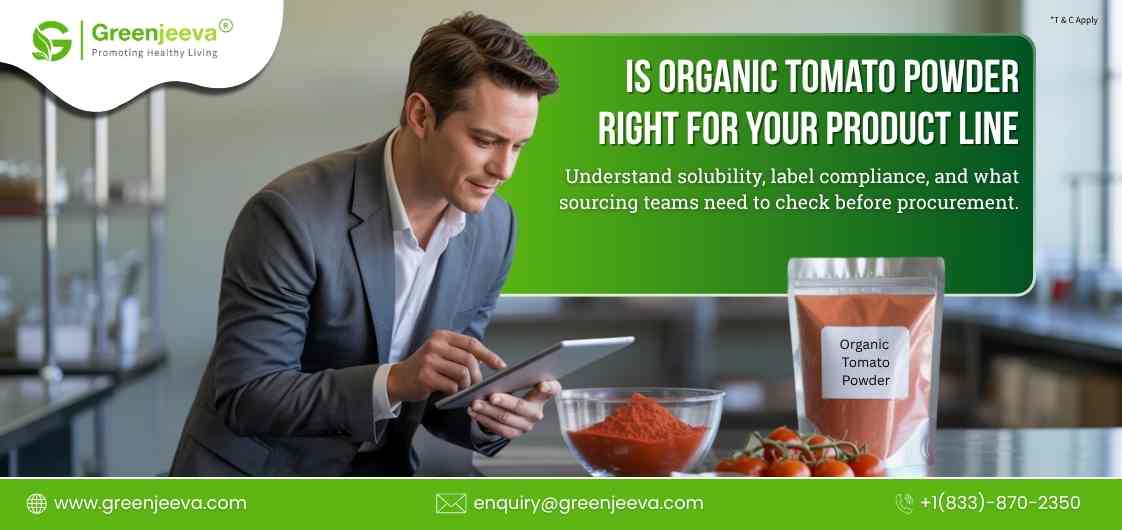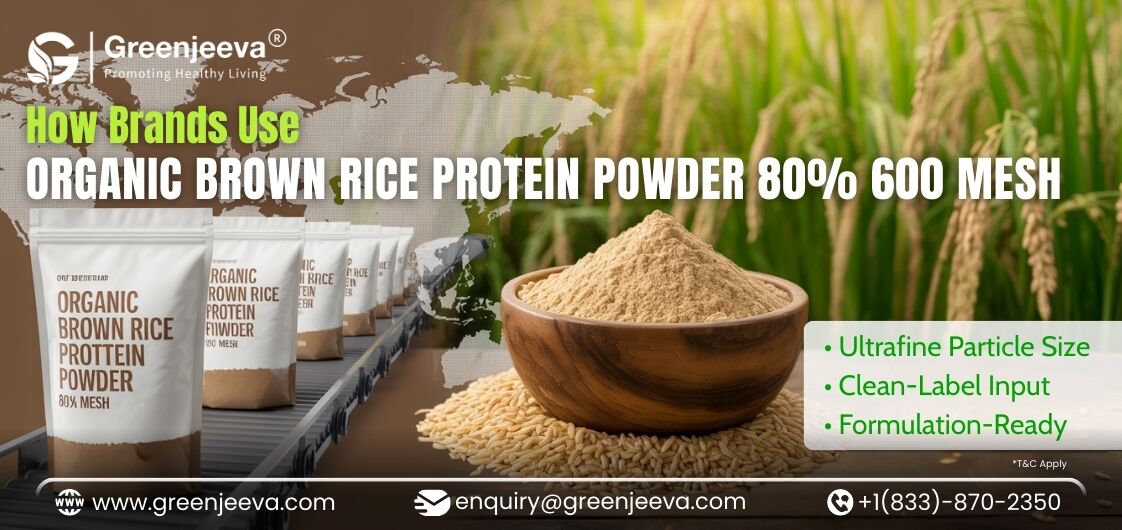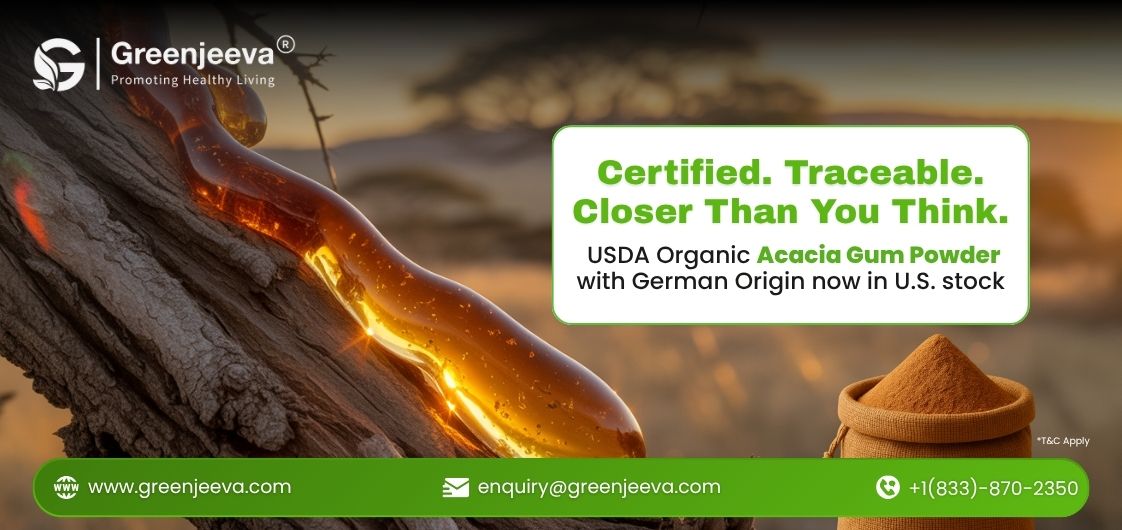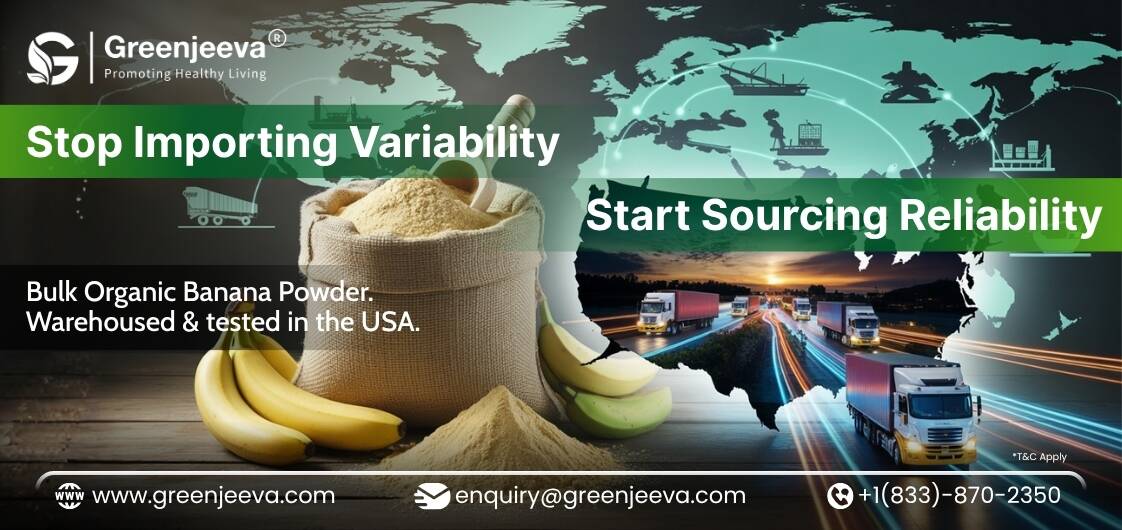Is Organic Tomato Powder Suitable for Functional Beverages and Supplements?

Nearly 1 in 4 new nutraceutical launches in the U.S. now carry a “plant-based” or “clean-label” positioning. (Innova Market Insights, 2024)
That shift isn’t just shaping consumer trends; it’s reshaping how sourcing and formulation teams choose ingredients. When you’re building a product that needs to do more with fewer ingredients, versatile inputs like organic tomato powder start showing up in your search.
But popularity doesn’t equal suitability. Can this fruit-derived powder hold up in high-acid beverage systems or moisture-sensitive supplement blends? Will it meet your USDA Organic, Non-GMO, and clean-label compliance without quality slippage? And is reliable bulk supply available when it’s time to scale?
If you’re considering organic tomato powder for a formulation, this article lays out what to check, from functionality and sourcing to certifications and storage risks.
Is organic tomato powder compatible with beverage and supplement formulations?
Organic tomato powder combines fine solubility, natural color, and organic certification, making it well suited for both beverage mixes and supplement formulations.
This ingredient is favored for its compatibility with clean-label and Non-GMO positioning, especially in North American markets. The powder’s fine particle size supports smooth dispersion in liquids, making it viable in powdered beverage applications, rehydration mixes, and functional drink blends.
For supplement manufacturers, its high concentration of lycopene precursors and naturally occurring antioxidants adds appeal, without triggering regulatory concerns. The low moisture content (<10%) and shelf stability enhance its suitability for tablet and capsule blends.
Key characteristics:
- USDA organic certified and Non-GMO verified for label transparency
- Disperses well in water-based systems with minimal grittiness
- Common inclusion rates range from 0.5% to 3% depending on flavor intensity and desired coloration
- Retains natural color compounds and micronutrient traces under controlled drying methods (freeze-dry or low-temp spray-dry)
What quality standards and certifications should you verify when sourcing?
Bulk organic tomato powder suppliers in U.S. must provide USDA organic certificate, COA with moisture/lycopene/heavy-metal data, and microbial all-clearance.
Sourcing decisions should begin with documentation. Organic tomato powder must be processed from certified organic farms and dehydrated in certified facilities without synthetic carriers or excipients. Procurement teams should request the following:
Required documentation:
- USDA Organic Certificate (NOP compliance)
- COA (Certificate of Analysis) covering:
- Moisture content
- Particle size
- Lycopene or carotenoid concentration (if applicable)
- Microbial and heavy metal limits
- MSDS
- Allergen and Non-GMO statements
- Pesticide residue data (especially for EU-bound exports)
- Batch-level traceability log
These reports not only ensure ingredient quality but also support internal audits and external regulatory compliance.
Can bulk organic tomato powder meet cost and supply needs for industrial use?
Wholesale pricing and bulk supply availability make organic tomato powder viable for beverage and supplement manufacturers sourcing in volume.
For mid- to large-scale manufacturers, consistency and price are major considerations. Bulk organic tomato powder is typically available in 20–25 kg bags, with monthly output capacity varying based on seasonality and region.
Key points to consider:
- MOQ: Most suppliers start at 25–50 kg; trial sampling usually available
- Wholesale pricing depends on:
- Drying method (spray-dried is generally more affordable than freeze-dried)
- Country of origin (India, U.S., Turkey, Peru are common sources)
- Harvest cycles and raw tomato availability
- Storage: Requires cool, dry conditions; shelf life of 12–24 months when unopened
- Shipping: Ambient container shipping is standard unless dealing with freeze-dried variants
- Working with a wholesale tomato powder supplier in U.S. ensures shorter lead times, lower freight cost, and better compliance with U.S. organic standards.
How are formulators applying tomato powder in beverages and supplement products?
Formulators use tomato powder in beverage mixes and supplement blends for color, flavor, and clean-label ingredient positioning.
The ingredient’s concentrated umami profile and vibrant color make it versatile across multiple formats:
Functional Beverages:
- Used in instant drink powders, sports beverages, savory rehydration mixes
- Often blended with herbs or salt bases in vegetable-forward functional beverages
- Fine particle size allows for rapid dispersion and even mouthfeel
Supplements:
- Applied in powder blends with other botanical ingredients for capsule filling or sachet packs
- Incorporated in tablet blends where its low moisture supports compressibility
- Often paired with ingredients like beet, carrot, or spinach powder for color and identity value
Tips for formulators:
- Run pH stability tests for acidic beverage systems
- Test for color intensity variation across batches
- Consider flavor-masking strategies if using at higher concentrations
What are the sourcing challenges and how can you mitigate them?
Challenges include seasonal supply variation, certification renewals, and quality consistency, all managed by working with a reputable USDA organic certified supplier.
Despite its advantages, organic tomato powder does come with typical bulk ingredient sourcing risks:
Common Challenges:
- Seasonality: Tomato harvest cycles vary across regions, affecting raw material input
- Certificate validity lapses: Suppliers must renew USDA and Non-GMO certifications annually
- Batch inconsistencies: Lycopene concentration and color can fluctuate due to agricultural factors
- Storage and shipping issues: Humidity exposure may affect powder texture and shelf life
Mitigation Checklist:
- Choose a USDA organic certified supplier with established QC systems
- Ask for specification sheets and COAs on a per-batch basis
- Conduct pilot trials using multiple batches before full-scale production
- Opt for suppliers with real-time U.S. inventory visibility and compliance-ready documentation
These practices not only reduce formulation risks but also streamline regulatory readiness and reduce the burden on your QA team.
Conclusion
Organic tomato powder has proved itself as a viable, clean-label option for formulators in the beverage and supplement categories. Its compatibility with powder blends, natural color properties, and organic credentials make it particularly valuable for brands focused on transparency and functionality.
Whether you're sourcing for a powdered drink base or designing a botanical capsule formula, this ingredient checks key boxes: solubility, compliance, and supply flexibility.
Need a USDA Organic Certified Organic Tomato Powder Supplier?
Green Jeeva offers bulk organic tomato powder with USDA Organic and Non-GMO certification, full documentation, and same-day shipment from U.S. warehouses. Reach out for a free sample, COA, or to discuss wholesale pricing tailored to your product needs.
Disclaimer:
This content is intended for informational purposes related to ingredient sourcing in the nutraceutical industry and should not be taken as medical or therapeutic advice.



.jpg)


